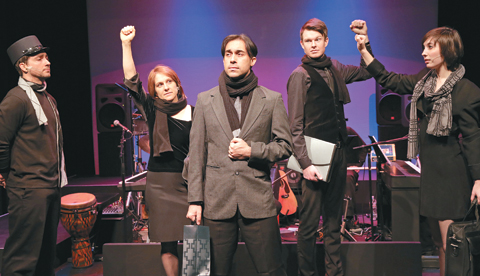
THE WILL TO RESIST Supplying skepticism along with holiday cheer. |
The singer Phoebe Snow has a great wry line about our next major secular holiday: "December 31st is the very worst time of the year. You have to find people that you like enough to share your beer." It's a sentiment that the protagonist of Striking 12, a morose young New Yorker referred to as The Man (Ryan Duncan), would agree with. As his friends and officemates plan parties for the big night, he plans to stay in and nurse a beer alone. That is, until a young woman (Kelly Caufield) knocks on his door selling strands of "full-spectrum holiday light bulbs." She spurs him to rediscover the Hans Christian Andersen story of "The Little Match Girl," and ultimately his holiday goodwill, in the Maine premiere of this yuletide theater alternative. Striking 12 is an upbeat, refreshingly low-frills musical ensemble show — a "holiday non-spectacular non-extravaganza" — under the direction of Brian P. Allen, for the Good Theater.
"Non-spectacular" means, among other things, no period petticoats or frock coats; all eleven performers wear sleek black- or gray-on-black, a good palette for both its primary setting, modern New York City, and its sub-setting, on the 19th-century Danish streets. Spatially, a sharp five-piece band (Stephen Underwood and Victoria Stubbs on keyboard, Bill Manning on percussion, John Lawson on bass and guitar, and Heather Kahill, beautifully, on violin) literally takes center stage. The actors (Erik Moody, Marie Dittmer, Samantha St. Onge, and Andrew Sawyer, all of whom are miked for singing), maneuver around them, interacting with them informally and in affectionately close quarters, and morphing nimbly between the voices in The Man's answering machine and TV, his co-workers, an ex, and the people one avoids at the more agonizing holiday parties.
As the New Year's dissident himself, Duncan (a guest artist from New York City) is sympathetic, blessedly subtle and self-deprecating in expressing his funk, and he has a pleasant conversational ease in his musical phrasing. As his light-offering catalyst (and her Danish counterpart), Caufield has her usual luminous candor and exquisite, clarion voice. She creates beautiful and evocative moments of simple actions, as when her lightbulb seller delightedly leans back against a pole to watch the snow fall, and she also pulls out the emotional stops as she takes her characters to heights of desperation.
The rest of the cast has a lot of fun with their various roles, often to really funny effect. Particularly notable are the bitchery of St. Onge's Diane, The Man's ex, phoning him to forbid his presence at a certain party; Dittmer's intolerable "Space Invading Girl" getting too close to him in his imagining of said party; and Moody's loud and douchey Jack, a friend of The Man's who has invited a calendar's worth of Brooklyn Babes with Biceps to his new year's party. The band members (billed as part of the cast) also get to put in their two cents, shout out to the actors, and even debate the merits of the show itself.